[caption id="attachment_3187" align="aligncenter" width="375"]
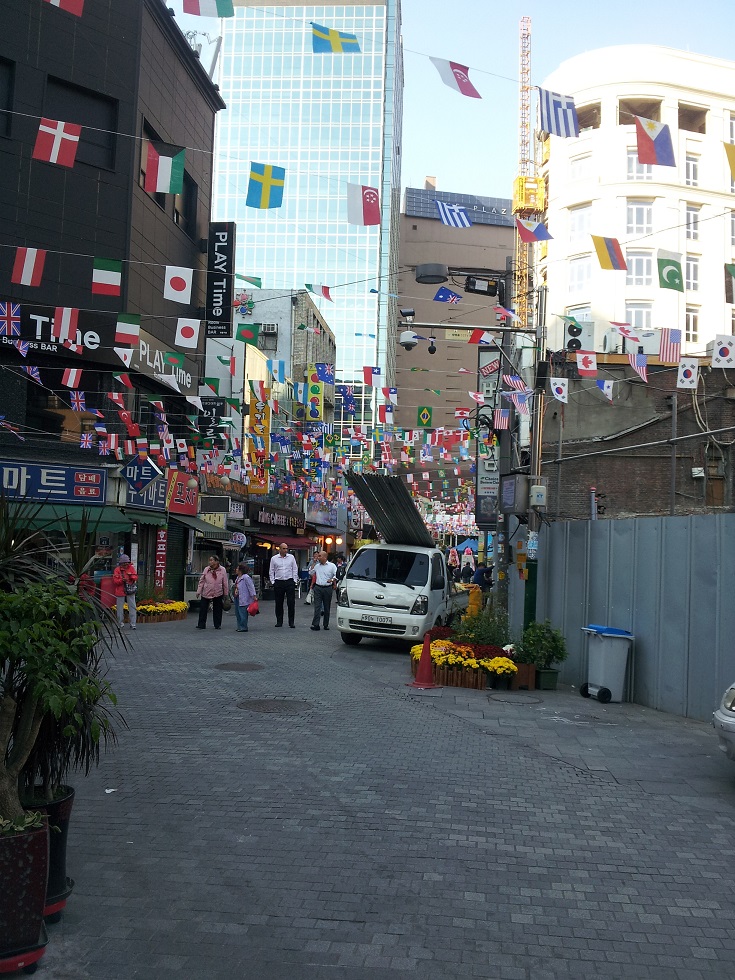
Why should we have all these flags when just one would suffice?[/caption]
The human race now possesses the ability to share ideas among a more culturally diverse range of people than has ever been possible in the entire history of our species, thanks to the Internet. Pretty big, right? Well, maybe not. As I argued in
last week's post, the numbers suggest that we're not actually putting the theoretical globalizing power of the Internet into practice, in that we still tend to organize our online communities around shared geographic and cultural identities.
But is this really a problem? We're already inundated in information, and the brain can only process so much. What does it matter if those data come from sources within or beyond our so-called cultural groups? In short, what's so great about diversity anyway?
Well, why don’t we ask the first single-celled organisms that figured out how to exchange genetic material with their neighbors--or, better yet, the antibiotics slowly being rendered obsolete by their promiscuous, rapidly evolving descendants--about how important diversity in possible reactions to the environment is for the fitness of an organism in our ever-changing world. And let’s accept for just a moment Richard Dawkin’s model that certain tenets of culture, like the genes carried by living things, might be represented as “memes” that spread throughout a population with differing levels of fitness and virility
[1]. Given the experiences of our unicellular friends, wouldn’t it be the case that the ability to draw material from a variety of diverse sources, like a conjugating protist or transducing bacteria, is beneficial for the fitness of an idea or, by extension, the society that absorbs it? A forest of Dutch Elms might have a certain charm that a forest of mixed maples, beeches, pines, and elms doesn’t have, but when that epidemic of Dutch Elm disease hits sooner or later, I know which one I’d rather build my log cabin in.
Okay, fine. Maybe diversity and sharing are fine for the world of high-school biology case studies, but we’re neither single-celled organisms nor plants. Except that an examination of several societies throughout history supports the theory that those who thrive are those who borrow, so all hail the supersymmetric tree of life. For example, the Tang dynasty is often recognized as the heyday of the nation we currently call China. From 618 to 907 A.D., the Tang boasted the most populous city in the world at its capital Chang’an, the invention of gunpowder and woodblock printing, and several dozen drunk poets good for a few exam questions in college Chinese literature classes. Interestingly, the Tang also saw the rise of the Indian religious philosophy Buddhism and consequent migration of monks from south and central Asia into China, intermarriage between Chinese nobles and nomadic peoples of the western steppes, and the increased tolerance of outside cultures that ensued
[2]. Coincidence? Perhaps, of course; correlation absolutely does not equal causation. But, also, perhaps not. (This is sort of why I prefer lab science to history.)
The evolution of Japanese-Korean relations up through the sixteenth century also stands as testament to the upper hand afforded by cultural borrowing. For much of history, Korea occupied a privileged position as the transmitter of borrowed Chinese culture to Japan: Chinese characters, Buddhism, and even Japanese history texts flowed through the peninsula from the mainland, and, by some accounts, Korea maintained a largely amicable relationship with the islands
[3]. But, as the anecdote goes, from the time that the Japanese emperor Tokitaka saw a Portuguese adventurer on board a Chinese trade ship shoot a duck with his arquebus one day in 1543, “the gun enters Japanese history.”
[4] And Korean history as well, for not fifty years later, an army of Japanese entered the country as not quite polite robed scholars kowtowing to the intellectual might of the Chinese-supported Korean academic establishment but as well-armed conquerors eager to play with their new assimilated toys. With about 40,000 matchlock-carrying soldiers among their initial force of 160,000, the Japanese invaders made short work of the Koreans in the beginning, despite the latter’s own light artillery technology, itself borrowed from the Chinese. For all its technological handicap, however, Korea did eventually win the war against Japan---once it opened its doors to Chinese military allies
[5].
[caption id="attachment_3188" align="aligncenter" width="945"]
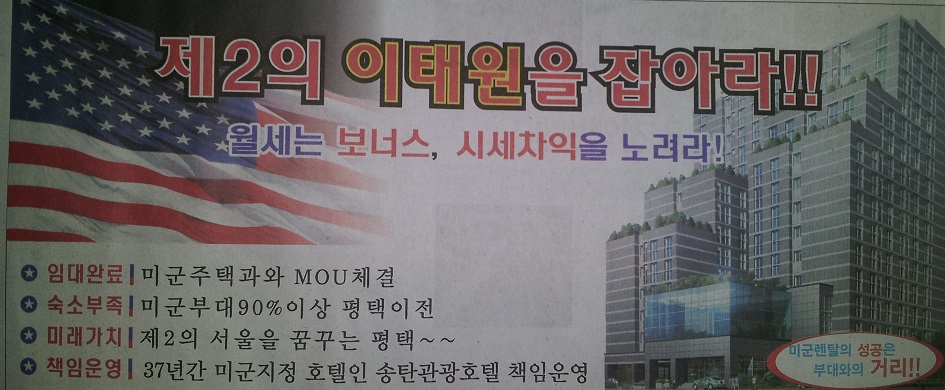
This Korean real estate company is using the presence of American soldiers as a selling point for an apartment complex in Seoul. Should potential buyers be running instead?[/caption]
And what, exactly, was so great about Peter the Great? He turned Russia from a backwater of greasy-bearded bear hunters into a world power in the mid-eighteenth century. How? Maybe his affinity for borrowed culture played a role. By multiple accounts, Peter looked to Europe as a social and aesthetic model for his own nation. He modeled elements of his new capital St. Petersburg after the canal systems of Amsterdam and the gardens of England
[6], required court nobles shave their beards after the French style and adopt French dress, and decreed that henceforth women as well as men were to participate in courtly entertainments---as long as they were dressed after the English or Dutch fashion.
[7]. In doing so, he was hoping to emulate the successes of a region whose accomplishments in technology, politics, and culture he admired. And, judging from his hard-won military victories against Sweden that earned Russia some new territory and himself the title of “Emperor of all Russia,” his eponymous capital city, and, of course, a place in history as “Peter the Great,” he clearly succeeded at emulating someone’s success
[8].
So natural as well as anthropological history offers examples of successful biological and societal organisms characterized by readiness for outside exchange. But what about societies with closed ideologies---those stuck in an evolutionary rut, if you will? Well, the modern world offers, among others, the convenient example of North Korea, a communist dictatorship with high-level political, social, and economic barriers shuttering in a society into which even the Internet has very limited penetration. Its biggest exports these days seem to be angry nativist rhetoric, failed missile launches, and hungry defectors. Not quite the steps a nation might take toward a glorious historical legacy.
Cultural borrowing does not just confer benefits upon the borrowers but upon everyone with the capacity to enjoy the results. Those who borrow are able to take advantage of their superior vantage point as an outsider to cherry-pick and develop the best aspects of a certain cultural phenomenon, thus improving upon the original; as the Chinese proverb goes, 旁观者清 (outside observers see the most clearly). For example, African slaves and their descendants in America borrowed from the tradition of European-American Christian hymns to develop their own brand of spirituals, which we know today as black gospel music. Anyone who compares the version of “Holy, Holy, Holy” by the Black Soul Gospel Choir (the members of which, I might add, hail from a diversity of backgrounds, further legitimizing “black gospel” as a musical form distinct from the original tradition from which it borrowed)
[9] with the more purist Catholic version
[10] might come to the conclusion that the borrowed meme distilled the celebratory spirit of the music while leaving behind much of the more, um, soporific aspects. The borrowed culture caught on a lot more strongly than the original, forming the basis for musical genres that may not have developed otherwise---blues, jazz, and eventually rock. I’m not arguing that the Beatles wouldn’t have existed had African-American slaves not borrowed from and improved upon church music---oh, wait; yes, I am.
Not only should we be paying attention to ideas worth borrowing from each other, maybe we should also be paying more attention to those already borrowed. Perhaps it is the case that elements of borrowed culture successful enough to spread throughout a new host society are inherently more fit--that is, useful or enjoyable--than equivalently popular elements of local culture. Assuming that a significant proportion of humans might be inherently averse to new ideas and art forms simply for their novelty, the mere foreignness of a foreign idea filters it through an extra selection pressure before it can enter another locale. In other words, you can’t hope to swim through the sea of Beyonce and Justin Bieber unless you tickle the synapses Gangnam-style. This, of course, is based on a loose assumption, since one could also argue that humans tend to crave novelty more than they fear it. Research citations, anyone?
But enough of the same; let's follow my own argument and get some more perspectives into this mix. Dear readers, what do you think? Does cultural diversity in and of itself confer special advantages on a society, or is the idea that cultural diversity promotes cultural resilience just biased hooey from a bunch of starry-eyed hippies in the liberal media?






 Ok, so I’m at an anime convention. I’ve been to these before, with varying results. Only this time, it’s in Japan (birthplace of anime), and at the mother of Japanese anime conventions - Animecon!
Ok, so I’m at an anime convention. I’ve been to these before, with varying results. Only this time, it’s in Japan (birthplace of anime), and at the mother of Japanese anime conventions - Animecon!
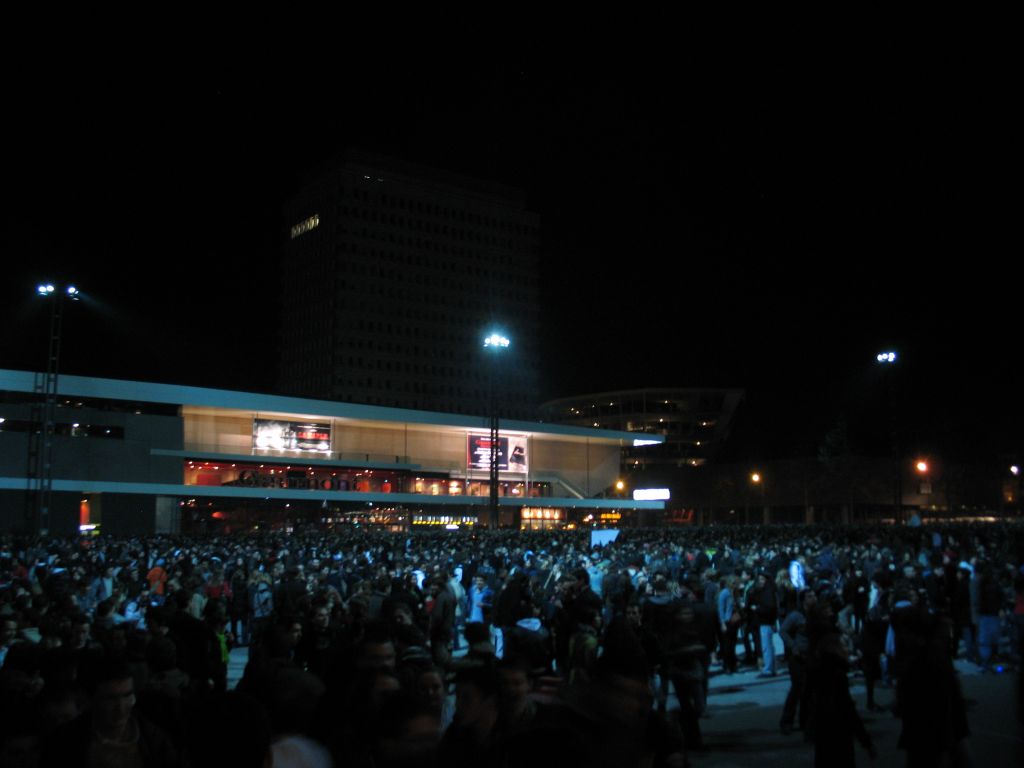

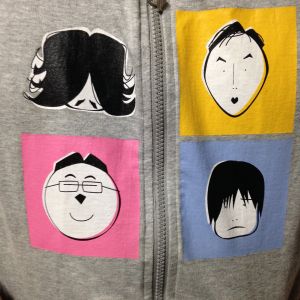
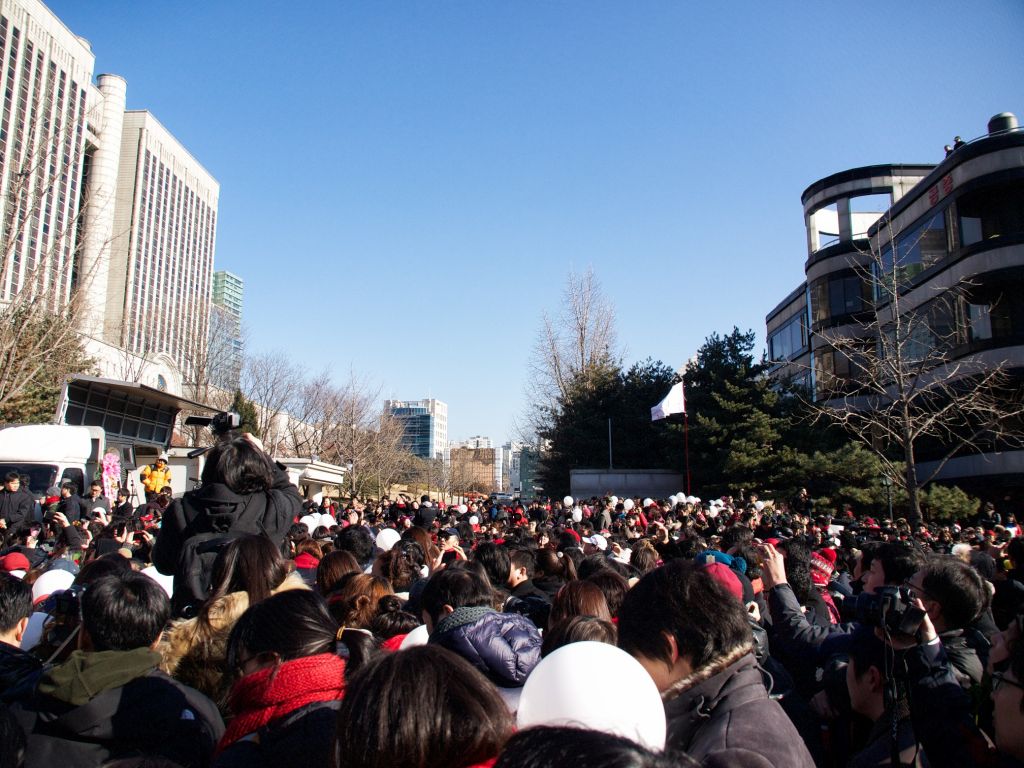

 How are Asians usually represented in film? The men traditionally played the role of the villain such as Ming in Flash Gordon. On the hand, women tend to be painted as soft, feminine and desirable.[/caption]
How are Asians usually represented in film? The men traditionally played the role of the villain such as Ming in Flash Gordon. On the hand, women tend to be painted as soft, feminine and desirable.[/caption] Slumdog Millionaire presented the slums of Mumbai in a brutal but honest light. Still, it would most likely turn viewers away from India.[/caption]
Slumdog Millionaire presented the slums of Mumbai in a brutal but honest light. Still, it would most likely turn viewers away from India.[/caption] Phi Phi island in Thailand. Since the Beach, the area has received an incredible boost to tourism but local culture and the surrounding environment have taken a battering.[/caption]
Phi Phi island in Thailand. Since the Beach, the area has received an incredible boost to tourism but local culture and the surrounding environment have taken a battering.[/caption]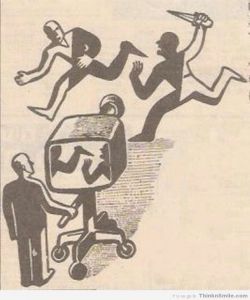


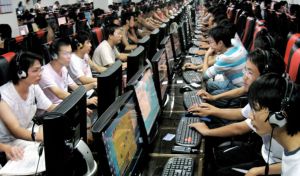



 Maybe Keanu has a point.[/caption]
Maybe Keanu has a point.[/caption]


